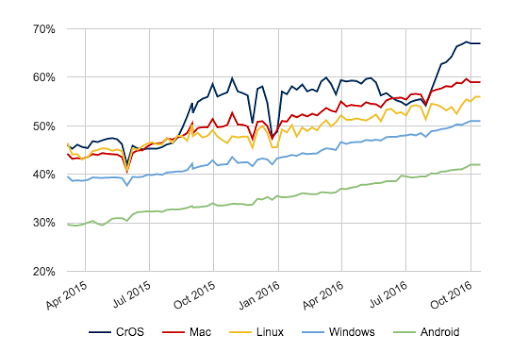2016 年 11 月 4 日(金曜日)
(Google セキュリティ ブログに同じ内容が投稿されています)
ウェブにとってセキュリティは常に重要ですが、HTTPS の導入に関しては、サイトの移行に伴う課題があるため、何年も進んでいませんでした。すべての人にとってウェブがより安全になるように、Google は、オンライン エコシステム全体で他の多くの企業と協力し、移行の課題を詳細に把握して対処することで、真の変化をもたらしてきました。ウェブに HTTPS の導入が普及するのは、遠い未来のことではありません。その変化は、今まさに起きているのです。Chrome ユーザーにとって、安全にブラウジングできることは当たり前になりつつあります。
本日、透明性レポートの HTTPS レポートカードに新たなセクションを追加しました。このセクションには、時間の経過とともに HTTPS の利用がどのように増加しているかを示すデータが含まれています。現時点で、読み込まれたページの半分以上、パソコン版の Chrome ユーザーが費やした総時間の 3 分の 2 は HTTPS 経由のものです。これらの割合は、今後も大きく増加していくと予想されます。

Google では、ビジネスが HTTPS に簡単に移行でき、セキュリティの強化以上のメリットを得られるよう、必要な支援を引き続き提供していきます。HTTPS は現在、ウェブで実現できる最高のパフォーマンスと、サイトの変換に役立つ強力な機能を備えています。強力な機能には、Service Worker またはオフライン サポートやウェブプッシュ通知などの新機能、およびクレジット カードの自動入力機能や、安全ではない HTTP 経由で利用するには強力すぎる HTML5 geolocation API などの既存の機能の両方が含まれています。すべての主要なサイトの移行と同様に、HTTPS への移行にも、検索ランキングの移行が円滑に進むようにサイトの所有者が実施すべき決まった手順があります。移行を支援するために、Google ではサイトの適切な移行に役立つよくある質問を投稿しています。また、ウェブの基礎に関するガイダンスを継続して改訂していきます。
検索ランキングとトラフィックにほとんど影響を与えず移行に成功しているサイトが数多くあります。大規模な小売サイトである Wayfair のマーケティング SEO 担当ディレクターの Brian Wood 氏は次のようにコメントしています。「Google ランキングや Google オーガニック検索トラフィックに実質的な影響なく、Wayfair.com を HTTPS に移行できました。Wayfair の全サイトは、現在すべて HTTPS になっています」大規模なテクノロジー ニュースサイトである CNET も同様です。CNET のエンジニアリングおよびテクノロジー担当バイスプレジデントである John Sherwood 氏は、「先月、CNET.com を無事 HTTPS に移行しました。移行してからも、Google ランキングや Google オーガニック検索トラフィックに変化はありません」とコメントしています。
サイトに広告を掲載しているサイト所有者も、大規模なサイトの移行中は、広告のパフォーマンスと収益の状況を注意深くモニターする必要があります。HTTPS 経由で配信される Google 広告トラフィックの割合は、過去 3 年間で劇的に増加しました。AdWords、AdSense、Google アド マネージャーなど、Google ソースのすべての広告は、必ず HTTPS に対応しています。一方、DoubleClick for Publishers などを通じて直接販売される広告は、依然として HTTPS に対応するように設計する必要があります。つまり、HTTPS に移行した後も、サイトに表示される Google ソースの広告には変わりがないということです。HTTPS への移行が成功した後、多くのパブリッシング パートナーがそのことを実際に確認しています。Washington Post のプログラマティック広告担当ディレクターである Jason Tollestrup 氏は、「AdX の収益に対して、SSL への移行による実質的な影響はありませんでした」と述べています。
HTTPS への移行がさらに容易になるのに合わせ、デフォルトでセキュリティが確保されたウェブを実現できるよう引き続き取り組んでまいります。ぜひ今すぐ HTTPS への移行を計画してください。
